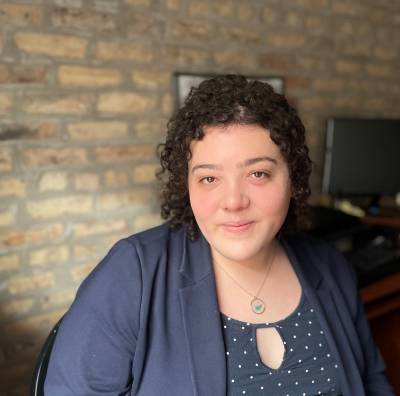
For Staff Attorney Nora Huppert, It's A Privilege To Advocate For Trans Clients To Have Their Voices Heard
Blog Search
Nora Huppert
Staff Attorney
Midwest Regional Office (Chicago, IL)
Pronouns: she/any
Nora Huppert first became interested in the law when as a teenager, she watched her mother, a baker in a Chicago suburb, face a coercive lawsuit by a powerful figure trying to get their way.
"I hated watching her being threatened with legal and financial consequences over nothing. I thought it was one of the worst things you could do to someone, especially someone without access to representation," Huppert explained, adding, "I wished I could have jumped in to fight it."
Since 2019, our former Renberg Fellow has been able to "jump in the fight" by advocating for the most vulnerable in the community. This gifted staff attorney has used her expertise, passions, and lived experience to work on numerous cases for Lambda Legal, including F.V. v. Jeppesen, a federal lawsuit challenging the State of Idaho's refusal to allow transgender people to correct the gender on their birth certificates. She is also working to defend California'slaw protecting incarcerated transgender people, SB 132.
"The best moments as a lawyer are those when I'm advocating for people with serious needs to have their voices heard and access to things that would dramatically change their life for the better," she stresses.
For the latest installment of our "Meet Our Lawyers" series, Nora discusses what inspired her to be a lawyer, how gender-affirming care is crucial for trans people, and why her mother's "cinnamon bomb" is her favorite dish to make.
What brought you to work at Lambda?
I began my transition shortly after I started law school, which turned out to be a very isolating experience. My little corner of the legal world felt very disconnected from my friends and community, and those experiences were where I felt most at home. Later in law school, while volunteering on some projects related to trans civil rights, I was introduced to a few of the brilliant trans people working at Lambda Legal and other places. It wasn't until I met those incredible trans advocates and activists that I saw how those two worlds could converge. Trans lawyers and advocates have been in the movement for decades, but this was the first time I saw firsthand what that could look like, which had a significant impact.
You are currently working on a case defending California's policy protecting incarcerated transgender people. Why is SB132 necessary, and what more can California do to protect incarcerated trans people?
SB132 is a groundbreaking law that ended the California prison system's policy of automatically housing trans women in men's facilities. The law protects incarcerated transgender people in many ways. Still, its central protection is allowing incarcerated trans people to be housed according to their personal perception of safety in a non-discriminatory manner. Nothing will make prison safe for trans people, but SB132 was an important first step.
Unfortunately, California's prison system has resisted the full implementation of the law. An anti-trans organization has filed a constitutional challenge, asking a federal court to stop California from implementing SB132 altogether. We intervened in the lawsuit on behalf of four incarcerated transgender women so that their voices could be heard. California must do more, not less, to implement SB132.
Earlier this year, you helped win a lawsuit against the state of Idaho for legal fees for your trans plaintiffs. Can you discuss the case and the state's unconstitutional birth certificate law?
In 2018, Lambda Legal challenged an Idaho policy that banned transgender people from correcting the gender markers on their birth certificates—and we won. The federal court issued an order requiring the state not to enforce that policy and to open up an avenue for transgender people to correct their birth certificates.
But in 2020, the Idaho legislature ignored the federal court order and passed legislation that would again functionally ban transgender people from obtaining gender marker corrections. We went back to court and obtained an order from the court clarifying that this new law did, indeed, violate the 2018 injunction, effectively striking down the new anti-trans state law.
Why is having the ability to correct one's gender marker so crucial for trans people?
For some, it can be an issue of privacy and personal safety. Identity documents like a state ID are often required for simple everyday activities like going to the store or the movies. When trans people are forced to use documents that don't match their appearance or reflect their gender identity, they have to disclose their identity as trans, which can lead to them being threatened and harassed. Similarly, your medical history is your own business, and you shouldn't have to disclose it just to work and live out in the world.
What has been your proudest moment working at Lambda Legal?
We have systems—states and laws—that make it more difficult for trans people to seek health care, some going as far as to ban and criminalize it. So, occasionally as an advocate, I have had the chance to see our trans clients and community members win access to the same healthcare that has been essential in my life. That is a special kind of victory.
Tell us something personal about yourself: What's your favorite meal to cook?
My mom worked as a baker, and there's a recipe she would make that holds a special place in my family's history. It's called a cinnamon bomb (essentially a fancy kind of cinnamon muffin). It makes for a great birthday surprise for my partner.




